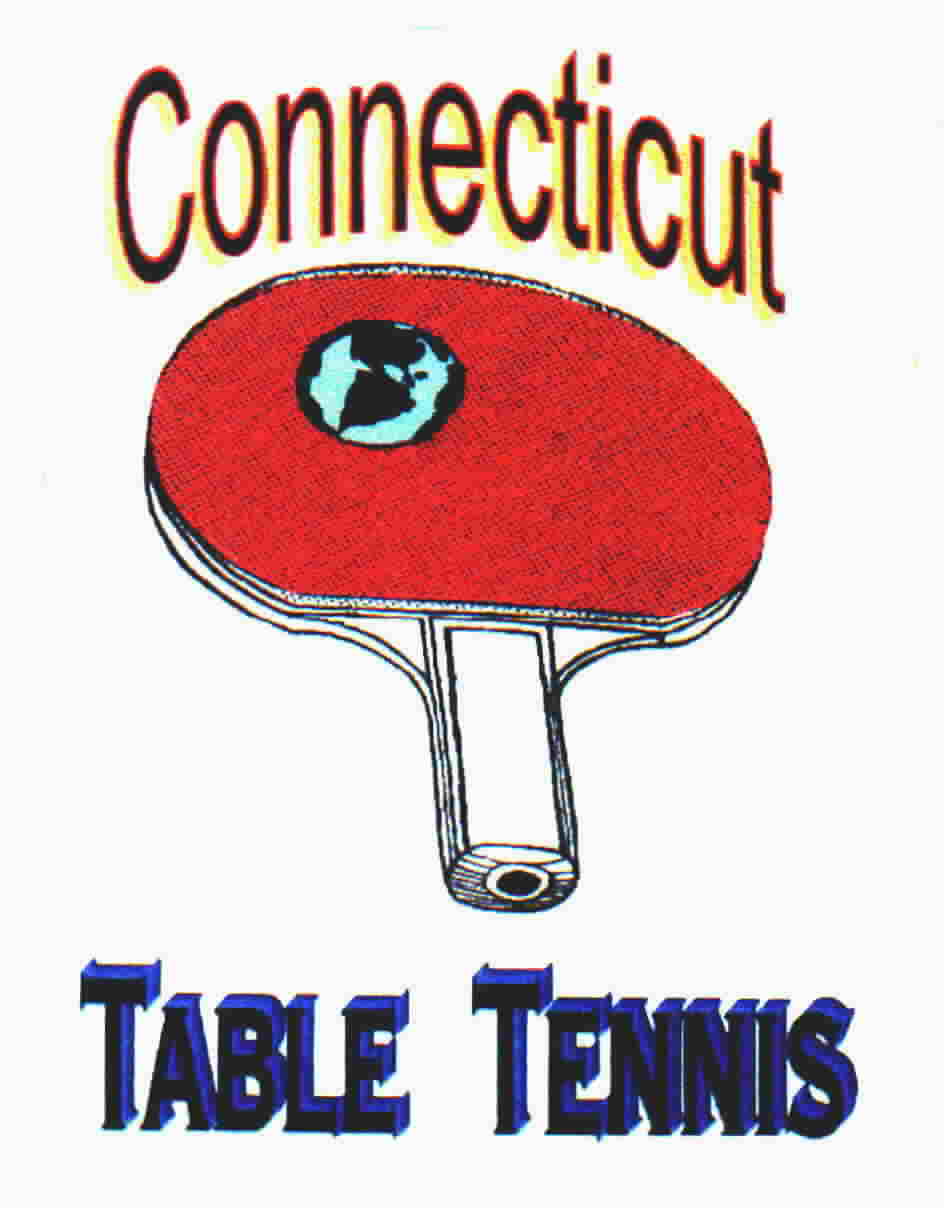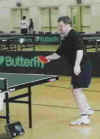
from The Connecticut Post - Sporting Life 11/19/98
“Table Manners” by Bill McDonald



This Tennis game open to players of all levels
It didn't take long to set the room up properly for table tennis.
The eight German-built Donic tables are wheeled out on their muffled
rollers around the large gymnasium at the former Oldfield School --
known today as the Fairfield Senior Citizen Center,
Partitions, 7 feet long by 30 inches high, are positioned in
from and behind each table row to make sure balls don't bounce too far
off. W-shaped cardboard rectangles of the same size are put between
each table for the same purpose.
Each player politely tosses back a wayward ball, but only if they
have time between playing points.
Welcome to one of three locations (Middletown, Fairfield and New
Haven) of the Connecticut Table Tennis Clubs of the Northeast Table
Tennis Association, where players don't call their sport ping-pong.
Ping-pong is just the slang term, maybe from the sound the ball
makes, NETTA director David Strang, of Middletown, said. "Parker
Brothers of Salem.Mass., patented the name in the early 19OOs after
originally calling it indoor tennis"
But the game actually became popular in England starting in
1923 with the English Table Tennis Association, then with the
International Table Tennis Federation of Berlin in '26, and the U.S.
Table Tennis Association (later known as USATT) in '33.
There is a misconception that, because the Chinese play the
game so well, that table tennis was invented in China.
"The Chinese got good at it when the country was closed off
during the Cultural Revolution in the late 1940s and everyone was
encouraged to play," Strang said. "It's probably one of the few good
decisions the Chinese (communist government) ever made. lt's a sport
that anyone can play -- old,young, tall, short, fat."
In most cases competition is open, meaning men can play
against women.Players have skill ratings ranging from world-class
2600 down to the so-called basement players (those who play in their
basements) at 200.
"No one is excluded here;' Strang said of the twice-weekly,
year-round meetings on Thursdays (7 to 10 p.m.)and Saturdays :
(2-5 p.m.) at the Fairfield Senior Center. The average turnout of
players is ,15 to 20.
"We have both competitive and recreational players here so
you always have a chance to improve your skills here since there
are always people here better than you Strang said, so you don't
have to play here long before you're better than most basement players."
There is one other USATT-sanctioned regional club, in Stratford,
which meets every Tuesday from 6 to 9 p.m. at First Congregational
Church of Stratford.The program is in its sixth year.
"We have three tables set up in a recreational room in back of
the church hall," club director Alan Dobyns said. '~We're a
friendly club, pretty laid-back. Half of our members go over to the
Fairfield club. We mainly offer people another night out to play pingpong."
When U.S.-China relations opened in the early 1970s with so-
called pingpong diplomacy, the Chinese blew away the U.S. team in a
friendly match.
China went on to dominate the competition when the sport made its
medal debut at the 1988 Olympics in Seoul. But a decade later, the
sport has achieved more parity, with Sweden and China vying for
best-in-the-world status and Russia, France, Germany and Belgium
not far behind.
Strang, a native of Kent, Ohio. sees himself as a "Johnny
Appleseed" of table tennis, a man roaming and planting seeds of
interest for the sport. The son of Kent State's football coach,
Strang grew up on campus and started playing table tennis in the
university's recreation center.
When he enrolled at Kent State, he soon joined the table tennis
team, became captain and was eventually ranked seventh in the nation.
Strang, 43, attained the USATT adult rank of 49th in the nation
out of some 20,000 players and got to train with the national team
in Colorado Springs while researching his master's thesis in sports
administration. He received his degree in 1989.
Strang moved to Connecticut in 1993 after responding to an ad
in a table tennis magazine, placed by Norm Chouinard of Waterbury,
asking for someone to help nurture the sport in the state.
"lt's big on the East and West coasts, usually in international
communities and cities where people from overseas come to work,"
said Strang, who promotes and teaches the sport full-time.
"Connecticut has a concentrated population and good highways,
so it's easy to get around. I doubt there's more than a dozen or
two like me in the country"
Strang believes his efforts are making inroads with core
groups in Middletown and Fairfield along with a youth program in
New Haven out of the Fair Haven Athletics Association.
"I originally saw an average of six to eight players per night
at each place Strang said. "Now there's more like 15 to 20.
We had our annual Connecticut Open last month. At our first five
years ago, we attracted 20. The last one had 40, so I guess you
can call all this a modest success story."
Members of the Fairfield club are from China, India, France,
Russia and Jamaica. Michael Lazarev, 52, lives in Greenwich but
grew up in St. Petersburg, Russia, where he started playing the
game at age 12.
"I've been coming to Fairfield for three years;' said Lazerev,
a program analyst. "I played all the time in Russia, then stopped
for 20 years.
When I came to the United States I couldn't find a game anywhere.
Then I went to the library and found out about USATT, called them
up and found out about this place."I do l0 tournaments a year.
I went to the Eastern Open last March in Baltimore. i didn't get
a high result,but I played against higher-rated people and beat
some of them and got an 1876 rating. I was happy."
Rich DeWitt of Fairfield, a 33-year-old market research
consultant, won the Connecticut Open by defeating Strang 3-0 in a
wild shootout.
"In the last game, Dave was 20 feet back from the table to
catch my smashes." said DeWitt, who boasts a 2144 rating compared
with Strang's 205I.
"1 smashed him about eight times, and the last one he missed.
Dave's good at spins and puts the ball high in the air, so when it
lands you don't know which way it will bounce." DeWitt started
playing when he was 10 and found out about table tennis clubs in
Manhattan and Brooklyn,places that offered good competition.
After graduating from the former Roger Ludlowe High School in
1983, he spent several years in Sweden to hone his game. Later,
he and a friend volleyed for 10 hours, 9 minutes -- a feat that made
the Guinness Book ofWorld Records. The record stood until 1985.
"I love the speed of(the game), the competition, the strategy.
I just really love this game;' said DeWitt, a regular at the
Fairfield club.
"Table Talk":
WHAT: Connecticut Table Tennis Clubs of North East Table Tennis Association.
WHERE: NETTA has three locations: Fairfield, New Haven and Middletown.
Other USA Table Tennis- sanctioned clubs in state are in:
(see USATT.org.)
Fairfield Table Tennis Club:
Fairfield Senior Center, 100 Mona Terrace.
Meets Thursdays 7-10 pm,Saturdays 2-5 pm
Call Dave Strang (see CT.TT link @ www.Realtabletennis.com for current #s).
Stratford Table Tennis Club: First Congregational Church of Stratford, 2301 Main St.
Meats Tuesdays 6-9 p.m. - except summer.
COST: Good players use high-quality paddles or racquets, which can range from
$70 to $125compared to those available in discount stores for so-called 'basement"
players ranging from $10 to $40.
Good table tennis tables, such as German-made Donic, cost around $1.000 each
with an inch-thick surface. Ordinary recreation table tops am usually no more then
a half-inch thick, costing about $100.Those with three-quartar inch surfaces range
from $300 to $600.
Ball quality ranges from one (more brittle, less consistant bounce) to three-star
ratings,ranging and From $2 up to $15 per dozen.
SPEED: A serious player can smash a ball at speeds up to 100 mph.
Spins can go up to 10,000 revolutions per minute.
NUMBERS: USA Table Tennis has 8,000 registered members, with an estimated
19 million 'basement" players involved in the game.There are about 300 USATT-affiliated clubs.